The AnandTech Coffee Lake Review: Initial Numbers on the Core i7-8700K and Core i5-8400
by Ian Cutress on October 5, 2017 9:00 AM EST- Posted in
- CPUs
- Intel
- Core i5
- Core i7
- Core i3
- 14nm
- Coffee Lake
- 14++
- Hex-Core
- Hyperthreading
Benchmarking Performance: CPU Office Tests
The office programs we use for benchmarking aren't specific programs per-se, but industry standard tests that hold weight with professionals. The goal of these tests is to use an array of software and techniques that a typical office user might encounter, such as video conferencing, document editing, architectural modeling, and so on and so forth.
All of our benchmark results can also be found in our benchmark engine, Bench.
Chromium Compile (v56)
Our new compilation test uses Windows 10 Pro, VS Community 2015.3 with the Win10 SDK to compile a nightly build of Chromium. We've fixed the test for a build in late March 2017, and we run a fresh full compile in our test. Compilation is the typical example given of a variable threaded workload - some of the compile and linking is linear, whereas other parts are multithreaded.
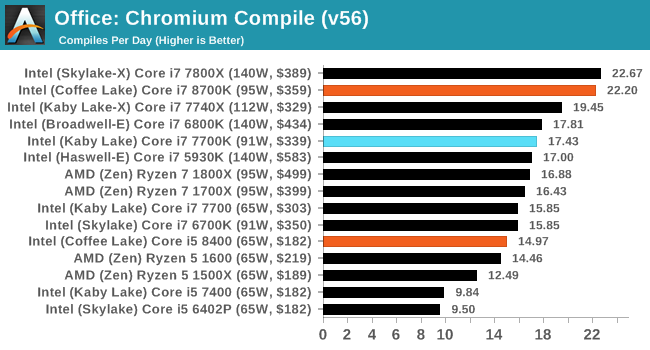
For our compile test, it would appear that the extra memory width afforded by the quad-channel memory of Skylake-X can have a direct benefit in compile performance.
PCMark 10
PCMark 10 is the 2017 update to the family favorite, PCMark 8. PCMark 8 has been part of our test bed since the latest update in Q1. For the most part it runs well, although for some processors it doesn’t recognize, some tests will not complete, leading to holes in our benchmark data (there’s also an odd directory quirk in one test that causes issues). The newest version, PCMark 10, is the answer.
The new test is adapted for more 2016/2017 workflows. With the advent of office applications that perform deeper compute tasks, or the wave of online gamers and streamers, the idea behind PCMark 10 is to give a better ‘single number’ result that can provide a comparable metric between systems. Single metrics never tell the whole story, so we’re glad that Futuremark provides a very detailed breakdown of what goes on.
Ganesh’s article on PCMark 10 goes into more detail than I will here, but the ‘Extended Benchmark’ runs through four different sets of tests: Essential, Productivity, Creation and Gaming. Each of these have sub-test results as well, including startup performance, web performance, video conferencing, photo/video editing, spreadsheets, rendering, and physics, which you can find in Bench.
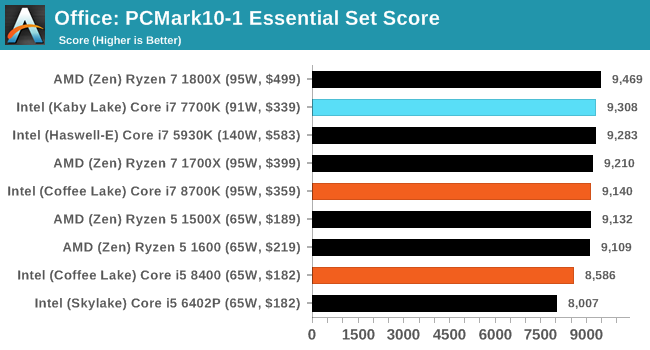
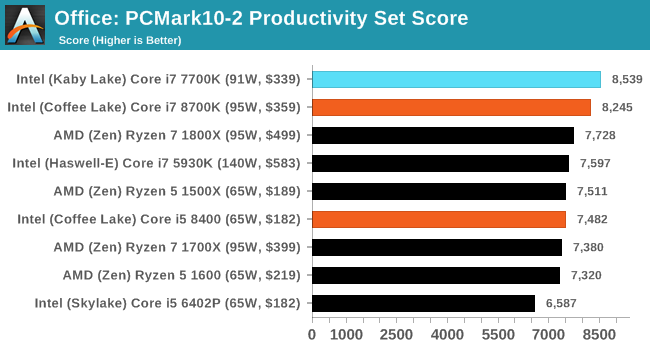
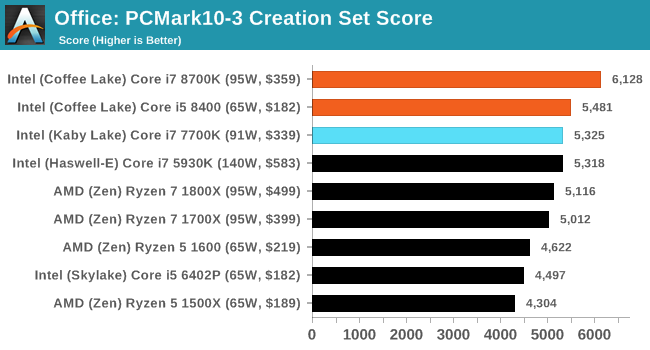
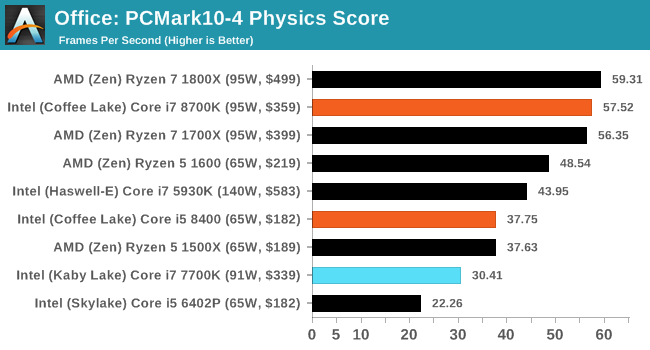
PCMark8: link
Despite originally coming out in 2008/2009, Futuremark has maintained PCMark8 to remain relevant in 2017. On the scale of complicated tasks, PCMark focuses more on the low-to-mid range of professional workloads, making it a good indicator for what people consider 'office' work. We run the benchmark from the commandline in 'conventional' mode, meaning C++ over OpenCL, to remove the graphics card from the equation and focus purely on the CPU. PCMark8 offers Home, Work and Creative workloads, with some software tests shared and others unique to each benchmark set.
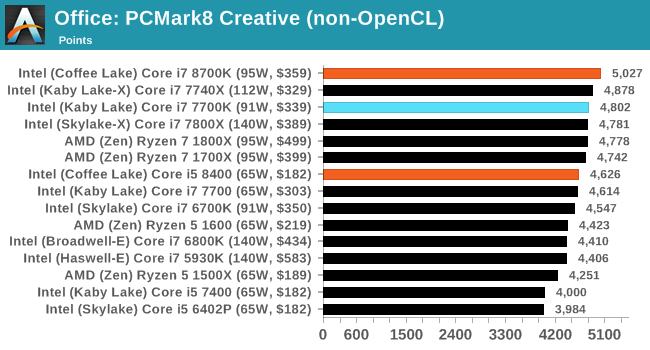
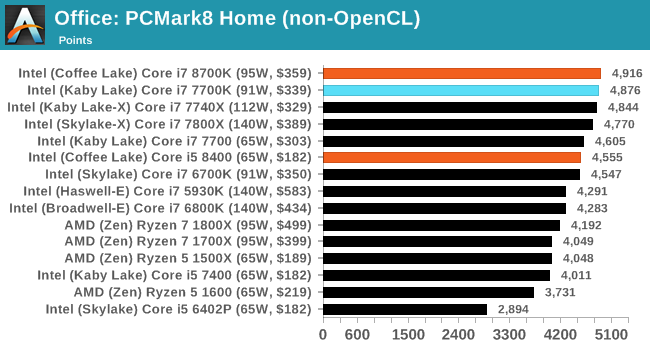
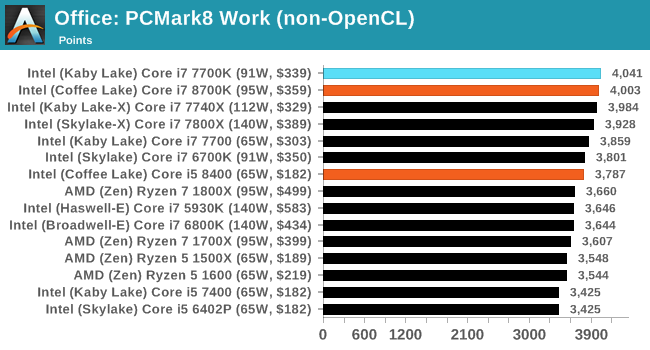










222 Comments
View All Comments
Zingam - Saturday, October 7, 2017 - link
Not everybody has a rich daddy! Performance per dollar matters in all areas of life!It doesn't matter to very, very rich people or sucker fanboys!
mapesdhs - Monday, October 9, 2017 - link
Again the myth that rich people don't care about wasting money. So wrong. :D As for fanboyism, that kind of label gets hurled in both directions, but IRL has little meaning.Gothmoth - Thursday, October 5, 2017 - link
an overlcocked ryzen 1700 is bit for bit the best choice.. still.except for hardcore gamers.
and i bet intel paid you quite a bit to ignore stuff other (less intel biased) reviewers pointed out today.
mkaibear - Thursday, October 5, 2017 - link
Ryzen has no integrated GPU so it can't be the best choice for anyone without a discrete GPU (aka the vast majority of the market - about 70% as per q1 2017). Ironically the gamers are the ones more likely to snap up Ryzen as they have discrete graphics cards anyway...Ananke - Thursday, October 5, 2017 - link
I see the same, ryzen 1700 remains the best buy, followed by ryzen 1600, which recent batches seems to have 8 cores instead of 6, for around $170. They do come with heatsink, another $30 saved. With ok board it will total $250. Even better, readily built Dell gaming desktops can achieve around $800 with r580 8gb and 16 GB ram with 1700 ryzen vs above $1100 for similar Intel. It is literally no brainer choiceGastec - Saturday, October 14, 2017 - link
Wow there, rewind! "Ryzen 1600, which recent batches seems to have 8 cores instead of 6". Care to explain more?Ryan Smith - Thursday, October 5, 2017 - link
"and i bet intel paid you quite a bit to ignore stuff other (less intel biased) reviewers pointed out today."You'd lose that bet.
Now since we're apparently doing this Jeopardy style, please tell me how much you wagered so that I know how much I'm collecting. Since Intel isn't paying me, you will have to do. ;-)
In all seriousness though, taking sides and taking bribes would be a terrible way to run a business. Trust is everything, so losing the trust of you guys (the readers) would be about the worst possible thing we could do.
FourEyedGeek - Saturday, October 7, 2017 - link
Are you happy for an overclocked Ryzen 1700 to be compared against overclocked Intel processors as well?gnufied - Thursday, October 5, 2017 - link
Your bench pages are either loading very slowly or displaying Gateway timeout.Ryan Smith - Thursday, October 5, 2017 - link
Thanks. Having the server team look into it.